Jewish learning Ep #7: Challenging Destruction: We Speak Up Despite the Odds
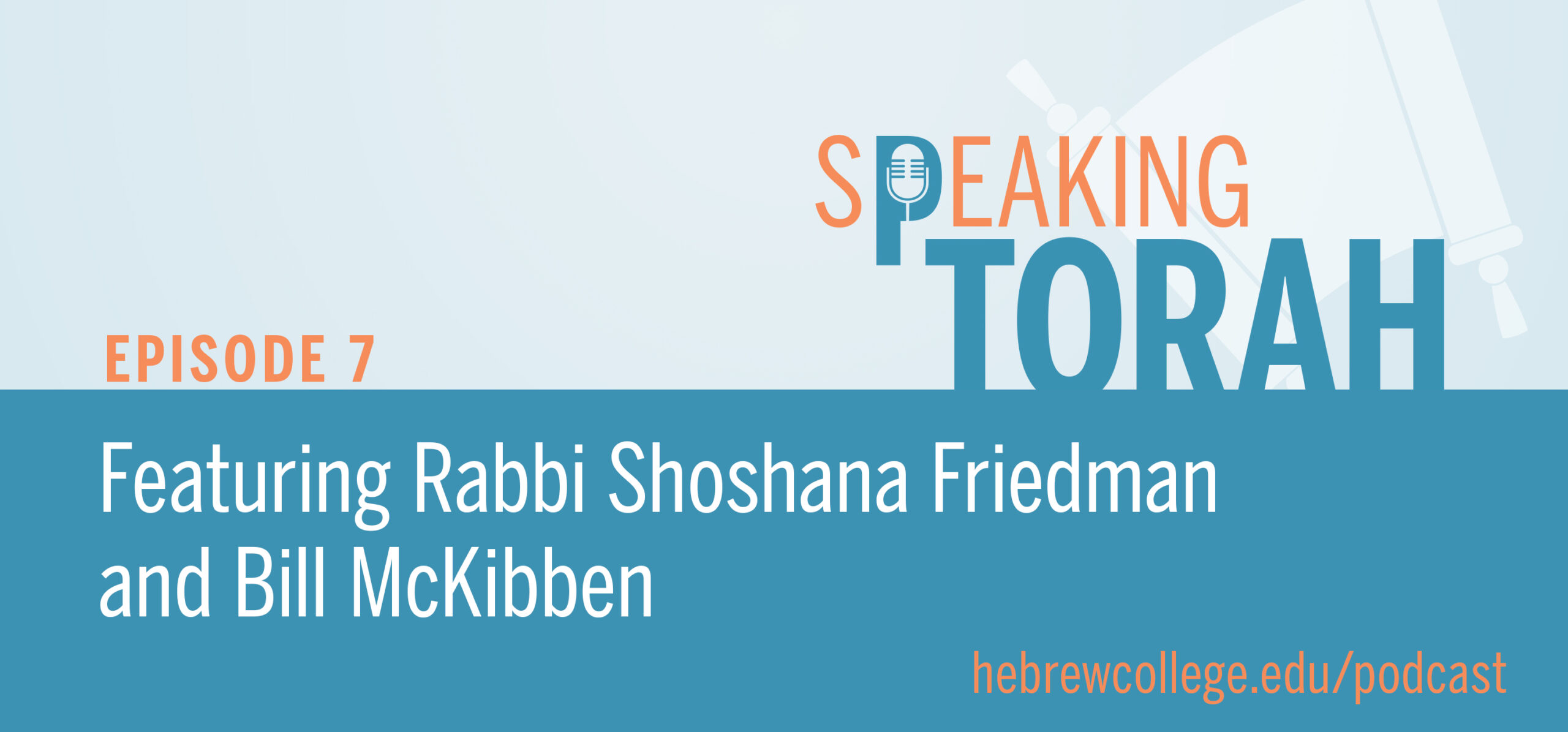
[Rabbi Shoshana’s] sermon makes us think again about Noah, who is a great ecological hero. After all, he saved a breeding pair of every animal on Earth. But it makes us think again about his agency and ours. And to me, that’s at the absolute center of thinking about the climate crisis.
– Bill McKibben
This week’s essay brings us deep into the story of Noah’s Ark and reframes what has often been designated as a children’s story as a tale of exploration in personal responsibility, lost opportunity, and a pressing call to activism that the world can no longer ignore in the face of the existential threat of climate change.
The author of today’s sermon is Rabbi Shoshana Friedman: a writer, mother, activist, and song leader in Boston. She serves as the Director of Professional Development and faculty member at Hebrew College and is a rabbinic advisor and ambassador for Dayenu: A Jewish Call to Climate Action.
Reading Shoshana’s sermon is Bill McKibben: a celebrated environmentalist, contributing writer to The New Yorker, founder of the grassroots climate campaign 350.org, and a Schuman Distinguished Professor in Residence at Middlebury College in Vermont.
Join us in this episode to discover the lessons from the ancient stories of Noah and the flood, and Abraham’s intervention in the destruction of Sodom and Gomorrah. And in the post-sermon discussion, both Bill and Shoshana share their thoughts about our role and responsibility to take action and speak up to encourage the collective consciousness needed to address climate change.
What You’ll Discover from this Episode:
- Where this story serves as a warning against paralysis in the face of destruction and disaster.
- What Bill believes we can learn from Noah’s missteps in being willing to step out of our comfort zone to avoid crisis.
- How Shoshana brings together faith and science, away from the usual perception of the two being in conflict with one another.
- The role that clergy has to play in protecting our planet.
- How Shoshana believes we can emulate Abraham in this story, speaking up despite the odds.
Featured on this Episode:
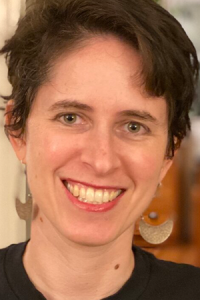 Rabbi Shoshana Friedman`14 (writer) is a writer, mother, activist, and song-leader in Boston. She serves as the Director of Professional Development at Hebrew College, and as a rabbinic adviser and ambassador for Dayenu: A Jewish Call to Climate Action. Her writing has been published in various venues including The New York Times, YES! Magazine, and Rooted & Rising: Voices of Courage in a Time of Climate Crisis (Rowman & Littlefield, 2019). Learn more about her work at rabbishoshana.com
Rabbi Shoshana Friedman`14 (writer) is a writer, mother, activist, and song-leader in Boston. She serves as the Director of Professional Development at Hebrew College, and as a rabbinic adviser and ambassador for Dayenu: A Jewish Call to Climate Action. Her writing has been published in various venues including The New York Times, YES! Magazine, and Rooted & Rising: Voices of Courage in a Time of Climate Crisis (Rowman & Littlefield, 2019). Learn more about her work at rabbishoshana.com
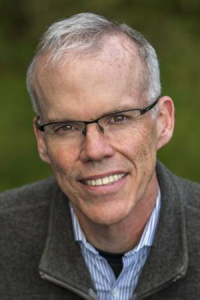 Bill McKibben (reader) is a contributing writer to The New Yorker, a founder of the grassroots climate campaign 350.org and the Schumann Distinguished Professor in Residence at Middlebury College in Vermont. He was a 2014 recipient of the Right Livelihood Prize, sometimes called the ‘alternative Nobel,’ and the Gandhi Peace Award. He has written over a dozen books about the environment, including his first, The End of Nature, published 30 years ago, and his most recent, Falter: Has the Human Game Begun to Play Itself Out? Learn more about his work at billmckibben.com.
Bill McKibben (reader) is a contributing writer to The New Yorker, a founder of the grassroots climate campaign 350.org and the Schumann Distinguished Professor in Residence at Middlebury College in Vermont. He was a 2014 recipient of the Right Livelihood Prize, sometimes called the ‘alternative Nobel,’ and the Gandhi Peace Award. He has written over a dozen books about the environment, including his first, The End of Nature, published 30 years ago, and his most recent, Falter: Has the Human Game Begun to Play Itself Out? Learn more about his work at billmckibben.com.
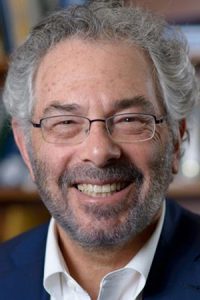 Rabbi Jeffrey Summit, PhD (host) is Director of the Hebrew College Innovation Lab. He is Research Professor in the Department of Music & Judaic Studies at Tufts University and Senior Consultant for Hillel International. The author of several books, among his many awards are a 2018 Hebrew College honorary degree, a GRAMMY nomination for his CD Abayudaya: Music from the Jewish People of Uganda, the Edgar M. Bronfman Award for Lifetime Accomplishment in Hillel Professional Leadership, and the Tufts Hosea Ballou Medal.
Rabbi Jeffrey Summit, PhD (host) is Director of the Hebrew College Innovation Lab. He is Research Professor in the Department of Music & Judaic Studies at Tufts University and Senior Consultant for Hillel International. The author of several books, among his many awards are a 2018 Hebrew College honorary degree, a GRAMMY nomination for his CD Abayudaya: Music from the Jewish People of Uganda, the Edgar M. Bronfman Award for Lifetime Accomplishment in Hillel Professional Leadership, and the Tufts Hosea Ballou Medal.
A special thank you for this episode’s musical contributions:
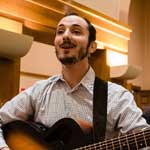 Intro by: Jackson Mercer
Intro by: Jackson Mercer
Jackson is an Ordination Candidate at the Rabbinical School of Hebrew College in Newton, MA. He grew up at Congregation Rodef Sholom in San Rafael, CA where he cultivated a love of Judaism, embolden with music, spirituality and justice.
Esa Einai (Psalm 121:1)
Music by Jackson Mercer
Guitar and Melody by Jackson Mercer
Harmonies by Cantor Rosalie Will, Ilana Sandberg, Rabbi Micah Shapiro, Rabbi Josh Warshawsky, Noah Diamondstein, Ryan Leszner, Eliana Light.
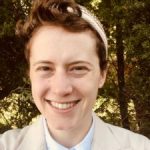 Outro by: Rabbi Noam Lerman
Outro by: Rabbi Noam Lerman
Rabbi Noam Lerman (they/them) was ordained at Hebrew College in 2020. Noam has acted as a chaplain for elders, incarcerated, and previously incarcerated individuals and are the founder of Sha’arey Ometz Gates of Resilience, a new online- based Jewish spiritual community, as well as Der Tkhines Proyekt.
Tree Nigun
Used at many Let My People Sing! gatherings.
Written by Rabbi Noam Lerman
Welcome to Speaking Torah. I’m your host Rabbi Jeffrey Summit, Director of the Innovation Lab at Hebrew College. In this podcast, leaders from Jewish communities around the country read essays by Hebrew College Rabbis and leaders. These essays tackle the pressing issues of our world that’s so in need of healing and hope. And they do so with Hebrew College’s signature compassion, creativity, and relevancy.
This week, Rabbi Shoshana Friedman brings us deep into the story of Noah’s Ark and reframes what might be mistaken for a children’s story as an exploration of personal responsibility, lost opportunity, and a pressing call to activism.
Shoshana’s essay is read by Bill McKibben. Bill McKibben is a contributing writer to the New Yorker, a founder of the grassroots climate campaign 350.org, and a Schuman Distinguished Professor in Residence at Middlebury College in Vermont. He was a 2014 recipient of the Right Livelihood Prize – sometimes called the Alternative Nobel – and the Gandhi Peace Award. He’s written over a dozen books about the environment, including his first, The End of Nature, published 30 years ago, and his most recent, Faulter: Has the Human Game Begun to Play Itself Out?
Rabbi Shoshana Friedman is a writer, mother, activist, and song leader in Boston. She serves as the Director of Professional Development at Hebrew College and is a rabbinic advisor and ambassador for Dayenu: A Jewish Call to Climate Action. Her writing has been published in various venues including the New York Times, Yes Magazine, and Rooted and Rising: Voices of Courage in a Time of Climate Crisis, published in 2019.
Now, here’s Bill McKibben reading Shoshana’s sermon: “Challenging Destruction: We Speak Up Despite the Odds.”
—
Bill McKibben: It astounds me that Noah’s Ark is a classic children’s story. I’m sure you can see the image in your mind’s eye; giraffes, lions, and zebras, packed side by side in a compact boat floating over a blue sea, with a rainbow and a white dove in the sky above. The scene signals that this is a lovely children’s story, perfect for the zero to five age group. Picture books about Noah abound. My son’s Hannukah menorah is a Noah’s ark, the tiny charismatic African megafauna covered more and more each year by cheerfully colored wax.
But if we look even a little deeper, Noah’s Ark is one of the darkest myths we have inherited. Not only do the world’s human beings, creatures and all terrestrial ecosystems perish mere generations after being created. Not only is this obliteration a direct result of the immorality of human beings. But the one person, the one adult in touch with God before the ordeal doesn’t say one word of protest. How is this a children’s story?
The Torah tells us that Noah was eesh tzaddik, a righteous man, and tamim, blameless or pure in his generation.
In his work The Kedushat Levi, Rabbi Levi Yitzchak, an 18th century Hasidic master, answers a question that Jewish sages have posed over the millennia. How can we call Noah righteous when he did nothing to try and prevent the flood?
He answers, there is a kind of tzaddik, a kind of righteous person, who serves God, but is so lowly in their own eyes that they think to themselves, “Who am I to pray for God to reverse the bad decree?” and therefore they don’t pray. Now even though Noah was a great and blameless righteous person, he was very small in his own eyes and did not have faith that he was a powerful righteous person with the ability to annul the decree of the Flood.
So, Noah was righteous, but not righteous enough. Not righteous enough to try to talk God out of sending the flood and destroying Creation.
The Kedushat Levi’s answer about Noah speaks directly to us. Each of us alive today is witnessing rising seas, super storms, raging fires, and extinctions – the modern-day Flood of climate change. The upending, in fact, of the very promise God makes to Noah that seasons, seed time, and harvest time will never cease.
And yet, like Noah, most of us stay in a place of inaction, or token actions. We see the global economic machinery at work. We know the entrenched political processes. We learn the grim science. And we are small in our own eyes. Who are we to even try? What can we possibly offer that is worth doing at this late moment?
But as sure as the flood waters recede, the ending of Noah’s story bares a stark warning against such paralysis.
The Noah’s Ark children’s books end with the rainbow and the dove. But the Torah continues. Just three verses past God’s promise, we learn the personal cost of Noah’s behavior.
Genesis 9:20 tells us, “Noah, eesh haadamah, man of the Earth, planted a vineyard.” Why is Noah called man of the Earth here? What has changed since he was called eesh tzaddik, a righteous man, back in Genesis 6:9?
The medieval Torah commentators suggests he was a master of the Earth, perhaps a skilled cultivator. But I read his new title in light of the second half of the verse, which reads, “Noah drank of the wine and became drunk and uncovered himself within his tent.” Genesis 9:20b.
Why does Noah get drunk? Because as the flood recedes, he is flooded with the understanding that he is a man of the Earth, a man who loved the land and the people and animals he lived among – and yet a man who failed to speak up to God on their behalf. He gets drunk to drown out his feelings – not just the inevitable grief for the suffering of the drowned and all that was lost, but the perhaps more terrible personal anguish of his moral failure to even try to save it all.
The 13th century mystical text, the Zohar Chadash, imagines just this moment before Noah plants the vineyard. We can imagine a stunned Noah, exiting the ark and confronting the magnitude of the destruction that has occurred beneath him and his family as they floated on the waves.
The Zohar Chadash reads, when Noah came out of the ark, he saw the world completely destroyed. He began crying and said, “God, how could you have done this? Why did you destroy your world?” God replied, “Now you ask me? And when I said, ‘All flesh will end’ you went into the house of study and didn’t do anything to fix that generation of yours!” In contrast to that, the Zohar Chadash continues, when God told Abraham that God would destroy Sodom and Gomorrah, Abraham stood before God and tried to save the wicked people of the city.
In contrast to Noah – who was righteous only when compared to the rest of his corrupt generation – the ancient rabbis laud Abraham as one of the greatest righteous souls among all the generations. The mystical tradition associates him with the divine quality of hesed, loving-kindness. Why? Because when God confides in Abraham that God plans to destroy Sodom and Gomorrah, Abraham speaks up and challenges God, “Will you sweep away the righteous along with the evildoers?” he asks. “Shall not the Judge of All the Earth do justice?” Genesis 18:26.
When Noah was 892 years old, Abram-who-would-become-Abraham was born. Their lives overlapped 58 years.
Imagine a young, curious Abram approaching the ancient Noah – as countless others must have done throughout the long 350 years Noah had to live with himself after the flood.
Imagine that through his drunken, traumatized haze, Noah sees something in the young Abram. Something that reminds him of the days he himself walked with God. Noah flashes clairvoyant, seizes Abram’s arm, pulls him close and hisses desperately into his ear, “When the Judge of All the Earth comes to you and tells you He plans destruction, make Him act justly.”
And so decades later, when Sodom and Gomorrah hang in the balance, Abraham asks God, “What if there are 50 righteous souls among them? Will you save the cities for the sake of the fifty? What if there are 45?” And God says, “I will not destroy for the sake of those righteous souls. Genesis 18:24-33.”
Abraham presses on: “What if there are only 40? 30? 20? 10?” Each time, God agrees: “I will not destroy for the sake of those righteous souls.”
And we imagine, Noah’s spirit finally rests in peace. But it turns out there weren’t 10 righteous souls in Sodom and Gomorrah, and the cities were destroyed.
Just as Abraham did not know what would happen when he spoke up to God, we do not know the outcome of our efforts to prevent the worst of climate change. Millions of us can dedicate our bodies, our savings, our time, our lives to the fight for climate justice, and we may still not keep warming to livable levels.
But we are descended from ancestors who knew how to redefine hope, how to redefine success. Loud as the thunder of 40 nights, Jewish tradition calls to us. There is no ambiguity. Despite the odds, we are called to be Abraham and not Noah.
And Abraham speaks to us, with the intimacy of myths that are never past, but only just behind the veil. Listen, “My beloved children,” he is saying. “If there is a fifty percent chance of averting the impending catastrophes, will you try?
My sweet blessings, what if your odds are 40%?
Will you put your money, your time, your political capital behind the climate movement then?
My shining stars of the night, my golden grains of sand, what if your chances are 30%? Or 20%?
As the species fall to the fossil record, will you put your body in the way of this madness? Your money out of the banks that fund destruction? As the storms come faster and more furious, if your odds are 10%, 5%, 1%, will you still resist in the streets, in the voting booths, in the halls of power?
Even as you adapt, even as you grieve, even as you witness Nature’s green resilience as She turns again into something new, even then, will you be among the righteous who challenge destruction, despite the odds?”
—
Rabbi Jeffrey Summit: What did you think of Shoshana’s sermon?
Bill McKibben: Well, first of all, it’s just a great sermon, if for no other reason than it makes us think again about Noah, who in some lights is a great ecological hero. After all, he saved a breeding pair of every animal on Earth, so the first radical green in that regard. But it makes us think again about his agency and ours. And to me, that’s at the absolute center of thinking about the climate crisis.
The problem with global warming has always been that it is so big, the biggest thing that humans have ever done, and by a large margin, and next to it, we are very small. And because of that, it’s hard for us to imagine that anything we could do as individuals might possibly matter.
And frankly, that intuition is, in many ways, correct. You know, I’m proud of the fact that my house is covered with solar panels and they’re connected to an electric car and so on. But at this point, one doesn’t try to fool one’s self that we’re going to get out of the mess were in one Tesla at a time, one vegan dinner at a time.
The math now implies that the most important thing an individual can do is be less of an individual and join together with others in movements large enough to change the political and economic ground rules, which is really our only chance.
And so, I guess in this sense, if we’re going to get God’s ear, as it were, we’re going to have to join together to shout loudly enough to be heard.
Rabbi Jeffrey Summit: Was there a particular part that spoke to you?
Bill McKibben: The comparison, which I had never heard before, the kind of link to the story of Sodom and Gomorrah was very powerful. And the idea that Abraham, in this story that the Rabbi spins here, the idea that Abraham might have taken a lesson from Noah on how to stand up and have some courage is very, very powerful.
We need people to take those kinds of lessons, to have that kind of courage. One way to think of it now is that the planet is way, way outside its comfort zone. So, we need to be outside ours in a way that the Rabbi says Noah really wasn’t quite comfortable being. He was shy. He wouldn’t stand up. And Abraham eventually would.
Well, we need to stand up too. We need to be outside our comfort zones. That will mean different things to different people. For me, it’s meant going to jail a lot more often than I would have imagined I would in the course of my life. And that won’t be true for everybody. But it may be true for some people.
Going to jail is no fun, but it’s not – at least for people who look like me – not the end of the world. But end of the world is the end of the world, and that’s why we need to do what we can do now, whatever it is. And it’s got to be more than we’re doing at the moment because at the moment, the temperature is still going up.
Rabbi Jeffrey Summit: What role does clergy have to play in protecting our planet?
Bill McKibben: There’s an incredibly important role for both clergy and laity in this work. There are just so many great opportunities now for people of faith to be really involved in these movements, including really powerful new interventions from the Jewish community.
The group Dayenu, that’s come up in the last year is one that I’ve gotten to work closely with and be on the advisory board of, and they’re doing remarkable work in helping change the politics around fossil fuel and climate change.
One of my kind of sidelights for 30 years has been helping to build the religious environmental movement, which didn’t exist 30 or 35 years ago. But there were great pioneers right at the beginning, including many from the Jewish community.
And they’ve laid down a lineage that centers ecological concern right at the heart of the faith experience, as indeed it should be. I mean, look, the Bible is one of those books that people tend to read the first page of more than the whole thing. But in this case, that kind of works because the very first things we’re told to do are go out and protect this beautiful creation we have been given. And so, it’s our greatest duty above all and we best get on with it.
—
Rabbi Jeffrey Summit: We asked Shoshana, what made her write this sermon?
Rabbi Shoshana Friedman: The piece, in many ways, is a product of many years of teaching these texts in conversation with each other and thinking about the story of Noah and his lack of responsibility and literally ability to respond, that he did not do anything other than follow orders around the flood, versus Abraham’s chutzpah in speaking up to God.
Putting those stories together, that is not my chidush, that’s not my new Torah, that’s something the ancient Rabbis did. But thinking about it in terms of climate change and in terms of, how do we internally organize ourselves, our minds and our spirits to be able to sit with the grief and the loss and the fear and the anger and all of the strong feelings that are completely natural and healthy responses to climate change and the other existential threats?
How do we sit with those feelings and move through them such that we are able to respond and emulate Abraham? That, in some ways, is a distillation of a major spiritual path that I’ve been on since I was a kid. I assumed I’d be a secular environmental activist and I assumed I’d go into policy for the first half of my life, and then realized that I actually couldn’t spiritually sustain that work, that I needed to be grounded in my own tradition and I needed to be grounded in a community of seekers and to learn how to lean on human wisdom and the wisdom of the Earth really intentionally if I was going to do activism and not completely burn out into despair and paralysis.
I want to give a really big shoutout to Dayenu: A Jewish Call to Climate Action, and to ask listeners to please check out dayenu.org. Dayenu has two main approaches and I want to speak about them briefly because they are both really connected to this sermon and informed this sermon.
The first is that we need systemic change and we need to be organizing ourselves to push for policy change. And we see that in how – I mean, these stories of Noah and Abraham, of course, they’re not ultimately stories of community organizing because these are stories of one individual speaking to God, and there are other stories in the Torah that are wonderful examples of a more power-building systemic change model.
But we do see in these stories that God is the changemaker, the one who has the ability to annul the decree of destruction. And that Abraham speaks to God in God’s own language and puts God’s words back into God’s mouth and God’s name shall not the judge of all the Earth do justice. And Abraham in that way is organizing himself to try to change the mind of the character in power – in the case of Genesis, that’s God. And we, at Dayenu, are really invested in strategic political action. And that goes at the state level and the federal level.
And the other piece that I want to lift up is that we cannot do any justice work – I believe, but certainly not climate justice work – without a spiritual and emotional grounding. And that’s because the issue at hand is so immense and so frightening and so overwhelming to our nervous systems and to our brains, the idea that half the Earth could become uninhabitable by the end of the century if no action is taken.
We can’t actually get that in our kishkes, we’re not designed to. And so, the little bit that we can get can send us into paralysis, understandably. And so, we need to be in conversation with these ancient texts that have stories where we as humans have faced catastrophe before, the destruction of the second temple, which obviously is the underpinnings of Rabbinic Judaism.
That is an incredibly important source story and the texts around that are incredibly important as we think about the climate crisis. Because we as Jews have navigated massive paradigm shifts before. The story of the Flood and the story of Sodom and Gomorrah are mythic examples of the human psyche grappling with, what does it look like to either speak up or not speak up in moments of existential crisis?
And I think we need these stories and we need the communities, like the community of Hebrew College, where I was blessed to go to rabbinical school and so honored to be on the faculty now. Communities that lean on these stories and that dig deep and draw deeply from the well of wisdom in these stories because, though we are, in so many ways, in unprecedented times, the human condition is not unprecedented.
We have faced paradigm shifts. Our species have, civilizations have before and we have faced this moment of, “You’ve got to change or it’s going to change on you and the only choice you have is how easy is this going to be? How much are you going to resist it and how easy is it going to be?”
We’ve faced that before. And we can learn from that and we can draw sustenance from it and we can know that there is so much more at play than what meets the eye. And we can sing and we can pray and we can feel our emotions and let them move through us and we can care for each other and grieve for each other and rejoice with each other. And Dayenu is also invested in that kind of community building and activism.
So, for that reason, I’m super, super honored to be in the role of Rabbinic Ambassador for them and in that role, I am working on telling these stories, these texts, like the Noah and Abraham texts in ways that are compelling and accessible and in ways that can help individuals to feel through the pain that often keeps us blocked from taking action and to feel through it, to feel how that pain actually connects us to each other, that when we stop resisting it, it’s a connective force and a sign of our health and a sign of our love for the world and for God and for each other.
And then, we can move into the kind of activism where I don’t know that, on the realm of physics, will be successful. I very much doubt that we will be in any obvious use of the word success. But I do know that, in the realm of the human spirit, in the realm of courage, in the realm of the resilience of communities, of learning how to be members of the biotic Earth community again, there is so much possibility for success there.
Rabbi Jeffrey Summit: How do you feel about Bill reading your sermon?
Rabbi Shoshana Friedman: Having Bill McKibben read the sermon is an incredible honor and one that I will carry with me forever. I am so grateful that he took the time to read it and to help me get this message out.
I count myself as one of the likely certainly tens of thousands, if not millions of people around the world who have been inspired by Bill McKibben’s work and have found their own voice in the climate movement, or as I have started to call it, the movement to sustain life. I’ve been so grateful for the leadership that he and his students demonstrated in founding 350.org.
And I don’t know all of his history super well, but my sense is that that launched or at least deeply contributed to the global climate movement as we know it today. The work that he’s done cannot be overstated.
I remember meeting him for the first time in person and he gave a sermon around climate change in a church where I was visiting. And he used the term that it was running Genesis in reverse.
And I remember that because – I believe that this was before I went to rabbinical school or it was right in the beginning of my journey to rabbinical school. And it just hit me how powerful it was and how evocative to use these very well-known source texts in our civilization to help people understand the magnitude of what’s going on and to help us understand the loss.
And I actually thought about that line as I was writing this sermon because of course that is what the flood does as well. The beginning of the Torah is God creating order out of the chaos out of the primordial deep. And then, the flood is the destruction of all of that order. A return to chaos and then a rebirth of order.
So, anyway, I can’t overstate the sense of honor. I think he is a prophet of our time with absolutely no quotes around the word prophet in the sense that he’s been telling us about this crisis for decades and has often been met with just total disregard for the power and importance and poignancy of the message when we look at the kind of change that he has known and so many have known is needed and how little of that change has been done.
It’s very hard to be a prophet. And living through these last 40-plus years of the climate movement growing has both been gratifying and amazing to see the climate justice movement, to see the intersectionality be recognized around this issue, to see so many people around the world be activated.
I can also imagine that it’s devastating because while we are acting as a society much more than we were, it’s still not enough and it’s still too late and the role of the prophet is to hold all of that and to hold the truth of their message and the pain of the often disregard of society of their message and to keep going anyway. So, I have only gratitude and deep respect and great love for this man.
—
Rabbi Jeffrey Summit: Thank you for joining us for this episode of Speaking Torah. We want to thank Emily Hoadley for our logo, and Hebrew College Rabbinical student and composer Jackson Mercer for our theme music Esa Einai. To learn more about Hebrew College, please visit hebrewcollege.edu/podcast. And remember to subscribe, like, and rate Speaking Torah on Apple Podcasts, Spotify, or wherever you listen to podcasts.
We’ll leave you this week with Tree Niggun, composed and performed by Hebrew College graduate Rabbi Noam Lerman. I’m your host Rabbi Jeffrey Summit, looking forward to the next time we meet for Speaking Torah.
Enjoy the Show?
- Don’t miss an episode, follow the podcast on Spotify, Apple Podcasts, Stitcher, or RSS.
- Leave us a review in Apple Podcasts.


